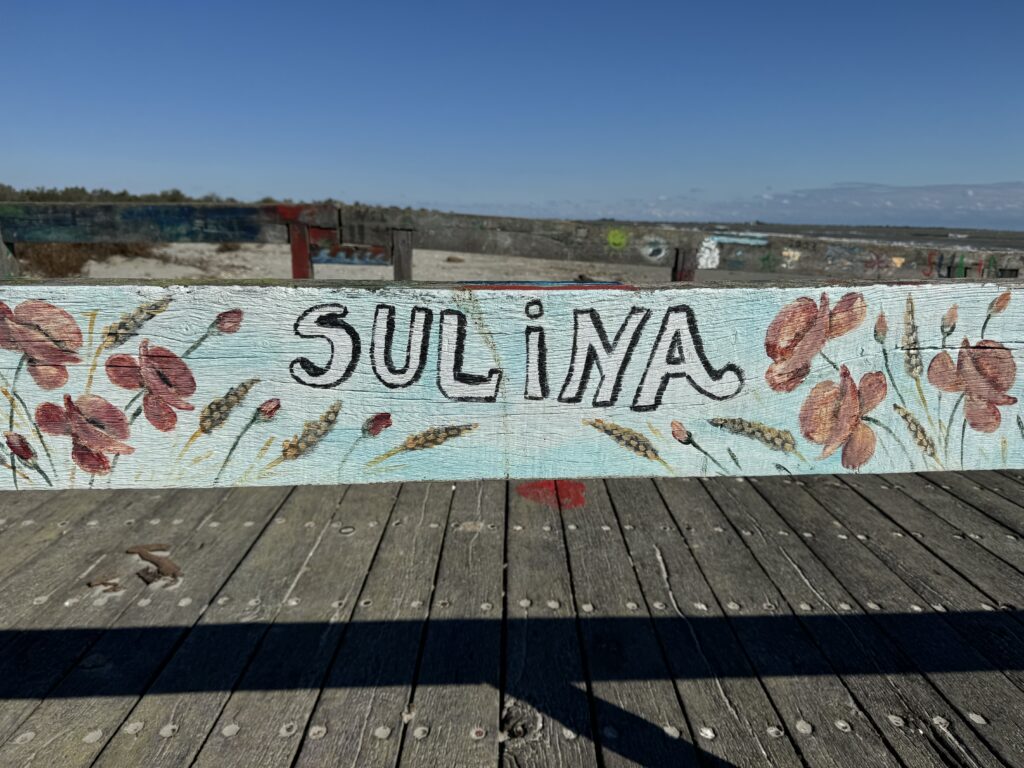In mid-October, I embarked on the first of many research trips as a Fulbright scholar to Sulina, a small town nestled in Romania’s Danube Delta. The journey, traveling from Bucharest to Tulcea by microbus and then by fast boat from Tulcea to Sulina, marked the beginning of a profound experience. Leaving behind the lively streets of Bucharest, I gradually felt the shift in pace and environment as I journeyed more profoundly into the Delta’s heart, where life flows in tandem with the water channels that sustain it. The boat ride revealed a beautiful, fragile landscape dotted with reed-covered islands and narrow waterways, setting the stage for the challenges and revelations that awaited me.
Arriving in Sulina, I was struck by how quickly the setting transitioned from the urgency of urban life to the unhurried rhythm of a close-knit town deeply connected to its natural surroundings. The people here have adapted to the region’s unique demands and, in return, rely on the Delta’s rich resources. My research aimed to explore this relationship, focusing on the fishing community and how fish contribute to local food security. However, as eager as I was to begin my interviews with the fishermen, I encountered an unexpected challenge: the locals’ hesitation, and at times outright reluctance, to discuss their livelihood and community. For someone dedicated to amplifying the voices of these communities, the silence was disheartening, and I questioned if I had missed a crucial aspect of building trust here.
As the first two days passed, I recognized the need to step back and experience Sulina on its own terms. Rather than pressing for interviews, I immersed myself in the town’s culture and rhythms. I walked through the narrow streets, admiring the colorful yet modest homes that reflect a lifestyle where functionality trumps luxury. Sulina Beach provided a quiet escape, where the soft lapping of the waves mirrored the gentle pace of life here. Even the meals I enjoyed, freshly caught fish prepared at Toate Panzele Sus, offered a glimpse into the significance of the Delta’s natural resources. These walks and meals weren’t just leisure; they were moments of reflection that helped me better understand the context of my research and the importance of trust in engaging with these communities.
By the third day, my understanding of my research goals began to shift. Perhaps, I realized, I had been too focused on food security and had limited myself by only aiming to interview fishermen. Sulina is a community where resilience and adaptability are woven into everyday life, affecting not only food sources but also the broader aspects of human security, including economic stability, environmental preservation, and cultural identity. As I broadened my focus, I began considering the impact of the Delta’s challenges on all residents, not just fishermen. I became open to speaking with anyone who had lived here long enough to witness the shifts in the Delta’s ecosystem and economy. This was a pivotal moment, as it underscored the importance of listening to diverse voices within the community, each of which offered valuable insights into the human security of the region.
Later that day, I experienced a breakthrough. After approaching conversations with a more open perspective, I connected with individuals who shared their stories. This helped me establish potential pathways to interview fishermen and other long-time residents in C.A. Rosetti and surrounding villages, including Letea and Sfiștofca. This new direction brought a sense of optimism and marked the beginning of what I hope will be meaningful, ongoing dialogues. My upcoming trip in mid-November now holds the promise of more profound engagement with these communities. I am eager to explore how their unique insights will shape my understanding of security in the Delta.
A highlight of my time in Sulina was a boat trip through the northern Danube Delta. This excursion offered a rare, tranquil glimpse into the Delta’s natural beauty, winding channels, and the stark beauty of autumn settling over the wetlands. Despite the crisp air, I was captivated by the quiet majesty of the place, with a few pelicans still lingering as they prepared to migrate. The serene landscape conveyed a sense of resilience, a reminder that the delicate balance of this ecosystem shapes the Delta’s human and animal inhabitants. The experience reinforced the significance of understanding and safeguarding not only the environmental health of the Danube Delta but also the human communities whose lives are intertwined with it.
This first research trip to Sulina laid a foundation for challenges and breakthroughs. It has reminded me that fieldwork often requires flexibility and openness to unexpected insights. What began as a project on food security has evolved into a broader exploration of human security, focusing on how the Delta’s unique challenges and beauty shape the lives of those who call it home. When I return in November to C.A. Rosetti, I hope to deepen these conversations, capturing the voices and experiences of the fishermen and long-time residents whose perspectives are essential to understanding the Danube Delta’s present and future.

